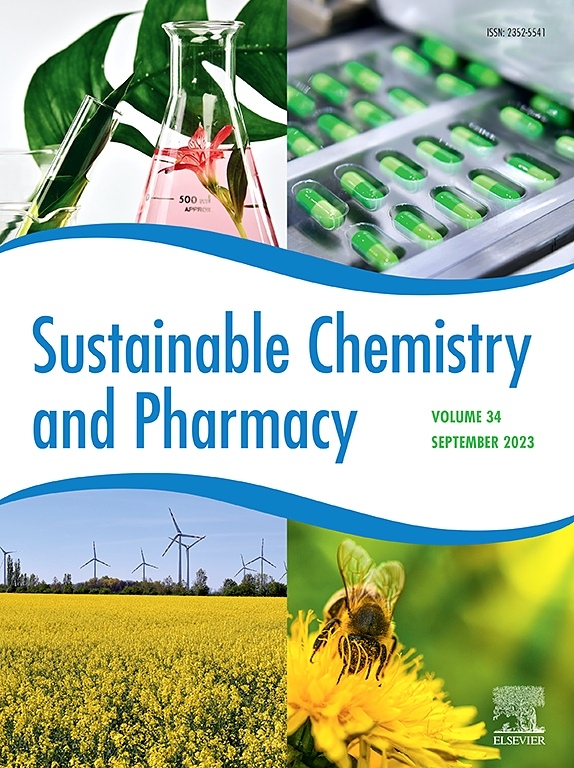Zinc-based oxides as alternative cheap and stable catalysts for the production of adipates from cyclopentanone and dimethyl carbonate
IF 5.5
2区 化学
Q2 CHEMISTRY, MULTIDISCIPLINARY
引用次数: 0
Abstract
Developing sustainable catalytic processes for specialty monomers is essential for advancing a renewable-based economy. Adipic acid esters, such as dimethyl adipate (DMA), are key intermediates in polyester and polyamide production and can be synthesized with complete atom economy (100 %) through the reaction of bio-based cyclopentanone (CPO) with dimethyl carbonate (DMC) or other CO2-derived carbonates. This study evaluates, for the first time, the catalytic performance of ZnO and Zn/Mg mixed oxides for this transformation. ZnO exhibited superior selectivity for DMA (53 %), compared to conventional MgO and CeO2 catalysts by effectively suppressing heavy by-product formation, thereby inhibiting CPO self-aldol condensation. This suppression minimizes catalyst fouling, allowing ZnO to be easily and readily recovered and reused without significant loss of activity. In contrast, Zn/Mg/O mixed oxides enhanced reaction rates but led to lower selectivity, primarily producing branched methylated adipates, which could serve as alternative polymer precursors. Optimization of catalyst composition and reaction conditions was critical for maximizing diester yields in this one-pot transformation, selectivity producing DMA over ZnO (up to 48 % yield after 7 h of reaction) or DMA and methylated DMAs (with yields higher than 40 % after 3 h of reaction in the presence of Zn/Mg/O). However, dedicated studies on the β-keto-ester intermediate revealed that methanol availability over the catalytic surface at the temperature required for the “one-pot” process (i.e. 260 °C) is a limiting factor. This constraint can reduce DMA yield and productivity due to the unselective decomposition of the intermediate, highlighting an area for further process refinement.

锌基氧化物作为环戊酮和碳酸二甲酯制备己二酸酯的廉价稳定催化剂
开发可持续的特种单体催化工艺对于推进可再生经济至关重要。己二酸酯,如己二酸二甲酯(DMA),是聚酯和聚酰胺生产中的关键中间体,可以通过生物基环戊酮(CPO)与碳酸二甲酯(DMC)或其他二氧化碳衍生碳酸盐反应,以完全的原子经济性(100%)合成。本研究首次评价了ZnO和Zn/Mg混合氧化物对该转化的催化性能。与传统的MgO和CeO2催化剂相比,ZnO通过有效抑制重副产物的形成,从而抑制CPO自醛醇缩合,表现出更高的DMA选择性(53%)。这种抑制最大限度地减少了催化剂污染,使氧化锌易于回收和再利用,而不会显著损失活性。相比之下,Zn/Mg/O混合氧化物提高了反应速率,但导致选择性降低,主要产生支化的甲基化己二酸酯,可以作为替代的聚合物前体。优化催化剂组成和反应条件是实现单锅转化中二酯产率最大化的关键,可以选择性地在ZnO上生成DMA(反应7 h后产率高达48%),也可以选择性地生成DMA和甲基化的DMA(在Zn/Mg/O存在下反应3 h后产率高于40%)。然而,对β-酮酯中间体的专门研究表明,在“一锅”工艺所需的温度(即260°C)下,催化表面甲醇的可用性是一个限制因素。由于中间体的非选择性分解,这种约束可以降低DMA产量和生产率,突出了进一步改进工艺的领域。
本文章由计算机程序翻译,如有差异,请以英文原文为准。
求助全文
约1分钟内获得全文
求助全文
来源期刊

Sustainable Chemistry and Pharmacy
Environmental Science-Pollution
CiteScore
8.20
自引率
6.70%
发文量
274
审稿时长
37 days
期刊介绍:
Sustainable Chemistry and Pharmacy publishes research that is related to chemistry, pharmacy and sustainability science in a forward oriented manner. It provides a unique forum for the publication of innovative research on the intersection and overlap of chemistry and pharmacy on the one hand and sustainability on the other hand. This includes contributions related to increasing sustainability of chemistry and pharmaceutical science and industries itself as well as their products in relation to the contribution of these to sustainability itself. As an interdisciplinary and transdisciplinary journal it addresses all sustainability related issues along the life cycle of chemical and pharmaceutical products form resource related topics until the end of life of products. This includes not only natural science based approaches and issues but also from humanities, social science and economics as far as they are dealing with sustainability related to chemistry and pharmacy. Sustainable Chemistry and Pharmacy aims at bridging between disciplines as well as developing and developed countries.
 求助内容:
求助内容: 应助结果提醒方式:
应助结果提醒方式:


